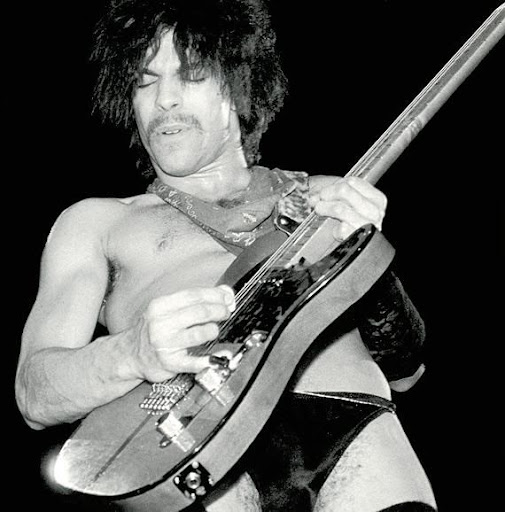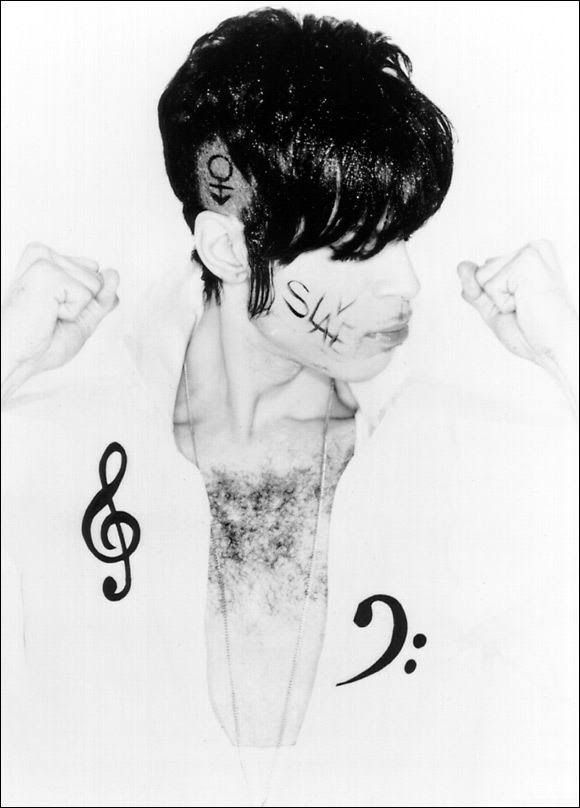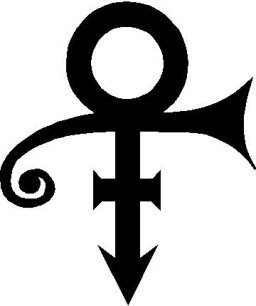
Good evening readers, how are you?
As I’ve been sitting in my loft room at my dad’s for nearly the past week I have rediscovered my admiration for the work of the Artist Formerly Known As An Unpronounceable Symbol, the one and only, Prince.
So what? You’re writing a blog post to tell us that you’ve gotten back into that skinny mother fucker with the high voice? (to quote the 1987 song Bob George)? Well not exactly. I’ve been working my way through his vast catalogue of hits and performances, starting in 1978 up to the latest shows in America earlier this year and something has had me wondering. Did Prince’s discovery of religion and a new-found spiritual self-awareness transform this once overt and enigmatic pop legend into a safe, secure and highly predictable eighties has-been washed up on the beaches of the contemporary music scene? Well, let’s have a look.

Who’d have thought the five-foot tall basketball playing son of a failed musician would have such a huge impact on the global music scene? Born the same year as his contemporaries Michael Jackson and Madonna, Prince lived and grew up in Minneapolis and was raised in a musical family; his name actually derived from his father’s band The Prince Rodgers Trio. Anyway, this isn’t a biographical account so let’s get straight to the music.
After leaving a small band 94-East, Prince released his first solo venture entitled For You in 1978 and when I say solo I mean, solo. Every song on the album was written, recorded and produced by Prince; every instrument played by Prince too. The only track to make any impact on the album was Soft and Wet. Classically Prince sounding, this song was to be the beginning of a career filled with sexually charged lyrics that would establish him as one of the raunchiest artists to grace the planet.

His eponymous title in the following year was home to the hit I Wanna Be Your Lover, an upbeat pop song about falling in love with a woman. Even here though, with the lyric “I wanna be the only one you come for” leaves little to be desired. The track on the album that perhaps grabs more attention is the powerful rock number Bambi, in which Prince is heard to be attempting to persuade a young lesbian that sex with a man is infinitely better than with another woman and, insists that maybe she “needs to bleed” to be fully satisfied with any sexual encounter.
Let’s put this into context for a moment. It is the late 1970s, the hippie movement is all but dead and the so-called “free love” ideaology along with it, yet here is a 19/20 year old black musician from a small town, Minnesota, singing quite frankly about sex. That probably amounts to the same sort of controversy as Lady GaGa’s meat dress. Prince was breaking boundaries long before anyone else, and his subsequent releases Dirty Mind and Controversy demonstrate this. Songs such as Head, Sister and Do Me, Baby all deal with sex in such an open, sometimes crude fashion that it appears he was aiming to deliberately shock audiences but also, perhaps he was trying to send a message? We should not be so up-tight and closed off about what is ultimately, at the core of human behaviour.

I could conduct a full length and in-depth (pardon the possible pun) investigation into the lyrics of early Prince, but I already did that as part of my English Language A-level. Needless to say that throughout the 1980s, Prince brought a new dynamic to the music industry. Donning four inch stiletto heels, fishnet stockings and thongs, girating around the stage doing the splits and moving proactively with the microphone stand and singing about incest gave the world something new to talk about. He was making the world rethink its sexuality, he was alienating a generation of parents…but captivating the minds of teenagers with dark pulsing bass lines, thunderous guitar solos and rebellious lyrics. Prince called out to the impulses of so many of the youth of the 1980s, especially the women.

There’s no doubting Prince was at his prime during the 1980s. A chart-topping double album, a soundtrack for the first Batman film, a number one album, song and film at the same time established him as one of the biggest stars of the decade, perhaps the century. Things went slightly downhill from then on however. After a disagreement with his record company, Prince would appear in public with the word ‘slave’ written across his face. In a move which shocked the world, to rid himself of the ties to his label and to undo the commercialisation of the name Prince, he changed his name to an unpronounceable symbol so as to ensure that no one could use his name as merely a tool to sell music.

Now, as many of you know I am an avid fan of Prince but something happened to the music as soon as ‘Prince’ stopped appearing on the cover of The Artist’s albums. Whether he generally wanted to take a new direction with music or whether the removal of ‘Prince’ removed some of the soul that was present in earlier material was the cause is down to you to speculate, nonetheless throughout the 1990s Prince continued to write sexually charged songs and provided performances to match. Perhaps he hadn’t lost himself completely? The main element of what made Prince so fantastic in the first place was still there, the lack of fear at shocking audiences, the innate ability to create music that would stir up feelings in each and every one of us and the gift of relating to human nature so beautifully and perfectly. Sadly however, it seemed that the world lost interest with The Artist. Who wants to take notice of somebody whose name they can’t even pronounce? It appeared both Prince and The Artist were dead.

The turn of the century marked a new chapter in Prince’s life. A ‘re-discovery’ if you will. The O(+> moniker was dropped and Prince was once again, Prince – not only this but a new-found religious and spiritual identity followed him into the new decade and with it, a new musical identity.
2001 saw the release of the piano solo album One Nite Alone and the jazz/funk infused The Rainbow Children. The latter is full of religious metaphor and imagery, so much so it’s hard to pretend you’re not listening to a new piece of tactical propaganda straight out of the ‘Bible belt’ of the States, nonetheless the smooth jazz and funk sounds are fantastic. The subsequent releases Musicology, 3121, Planet Earth, Lotus Flow3r/MPLSound and 20Ten have all featured the same James Brown-esque feel about it. Long funky guitar riffs and horn solos, but they all lack the same thing too. They lack what made Prince, Prince. You try find a song about a sordid encounter with a stranger or a guitar riff that symbolises sexual climax, you’ll be sadly disappointed. Instead Prince chooses to preach his views about the state of the world economy and the music industry, the environment and religion; views which, sadly only appear to be held by him.
It seems that, as fantastic a live musician he is and as funky and cool as his new material feels, it lacks the ultimate Prince-ness. It’s missing the qualities of the music that made the world fall for the little man from Minnesota in the first place. Even now, Prince will refuse to sing songs from his back catalogue because of their content and in some cases will even change the words to suggest a more mature, less trivial meaning (for example, in I Feel 4 U the lyric “it’s mainly a physical thing” is changed to “it’s mainly a spiritual thing”).
Prince has alienated a new generation of listeners by singing about topics that, frankly very few people can relate to or would even want to relate to. The only people who seem interested in Prince these days are the long-time fans of the 1980s or, people like me who have listened extensively to his catalogue and have grown to appreciate the later music (I still can’t abide the 90s though). I can appreciate that Prince plays, and I quote, “real music for real music lovers”. He must commended for this though, too many artists in this age of music rely on playback, electronic sounds and recorded instruments and merely make music just because they can. Prince makes music because it is his life, it’s what makes his world go round and what gives him cause to get out of bed and slip his little purple slippers on in the morning.
Perhaps then, Prince has matured and left the world behind. Perhaps religion and spirituality hasn’t ruined Prince but instead the ignorance of the world’s music audience has yet to appreciate the artistry, the craftsmanship and genius of the diversity of Prince’s music. If we want to hear songs about oral sex and prostitutes in hotel lobbies masturbating with magazines then the records are already there; Prince has left the world some fantastic music that will be returned to throughout the years. Perhaps we should follow his example, maybe we could all do with growing up and forgetting about our trivial thoughts and concerns about where our next sexual encounter will come from or whether we were good enough in bed the night before, maybe Prince is trying to tell us that there are bigger, more important issues out there in the world that we should all be more concerned about.
Did religion ruin Prince? No. Our ignorance did.


During the 80s, Prince was interested in us as his audience. He respected his audience and gave us quite a bit of incredible American music. He’s changed – he has become quite spoiled. Facts is, his records suck now. Thy lack the adventure that they once demonstrated. Blaming the audience for his inability to hold our attention with his religious babble is unfortunate.
Nice read. I also feel that his lyrics have taken an occult bent of late. Most people will probably label them as “new agey,” but after studying the subject for some time now I’ve realized that many of our so called geniuses have believed their minds to have penetrated deeper into themselves and reality. As a consciousness explorer myself, I feel that his lyrics are only getting more interesting.
Thank you for taking the time to read the article and to post a reply! I do agree with you – his lyrics are getting more and more interesting; however I still maintain that to a ‘mainstream’ audience, Prince has lost his way so to speak.